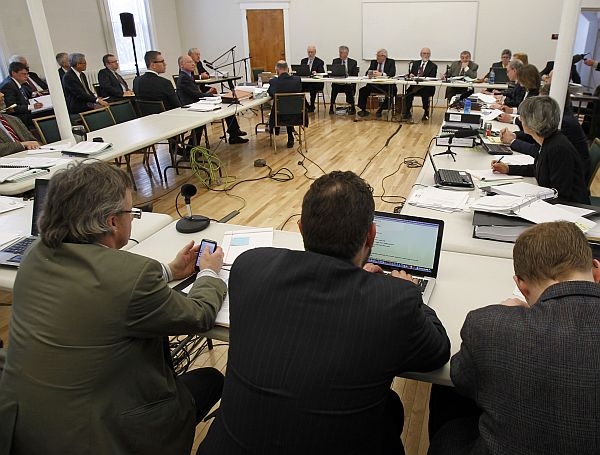
Lawyers for Entergy Vermont Yankee want to sharply limit the issues a state regulatory panel can review as it weighs Yankee’s request for a new 20-year state permit.
The Public Service Board is considering whether Vermont’s only nuclear plant can operate until 2032. The plant already has approval from the federal Nuclear Regulatory Commission.
But as the PSB kicked off the latest round of hearings, the shadow of federal pre-emption hung over the hearing room.
On the witness stand was Richard Heaps, a consultant who had testified about the positive impact Yankee has on the regional economy. But Entergy lawyers objected to questions about tourism and the Vermont "brand," or identity. They argued that any implication that tourism could be hurt by the nuclear plant was off-limits, because that question deals with nuclear safety, which only the federal government can regulate.
Entergy attorney Sanford Weisburst raised one of numerous objections.
"If radiological safety is perceived to affect the Vermont brand by a population of whoever is being surveyed, or if it’s perceived to affect tourism, then those consequences of safety are pre-empted from the board’s consideration," he said. "That is Entergy’s position."
This is round two of Vermont Yankee hearings before the Public Service Board. The PSB halted the first round in 2009.
And this round is being heard after a federal court ruled that the Legislature had strayed too far into areas of nuclear safety – which is under the sole authority of the Nuclear Regulatory Commission.
But District Judge Garvan Murtha did leave some room for the PSB to decide Yankee’s fate on issues not pre-empted by federal law, such as whether the plant is good for the economy of the state.
Yet precisely what areas are in or out-of-bounds have yet to be determined.
Geoffrey Commons is the lead lawyer for the Public Service Department, which represents ratepayers. He’s asked the PSB for a ruling that would require Entergy to give more detail on its pre-emption arguments.
"It’s been our experience and our view that Entergy’s claims of pre-emption are sometimes very vague and very broad and not… sufficiently well-supported to allow us to respond, and we think to give the board an adequate record to decide them on," he said.
Entergy has three law firms working on the case, and has filed several motions before the PSB and the state Supreme Court to limit the board’s authority.
But an analyst who follows the nuclear industry said Yankee’s future will be determined less by the legal system and more by the financial pressures facing the nuclear industry in general and Entergy in particular.
"Is re-licensing all that relevant in the context of how just fundamentally challenged the economics are here?" asked Julien Dumoulin-Smith, an energy analyst with UBS Securities.
Dumoulin-Smith said the abundance of cheap natural gas in New England – combined with the costly repair bills facing Yankee – may force the plant to close long before 2032.
"And I think it’s probably in the next 12 months that we get an update as to what’s the expectation is here," he said.
Dumoulin-Smith points out that other utilities in recent months have decided to shut down their older nuclear plants rather than invest millions of dollars in repairs.